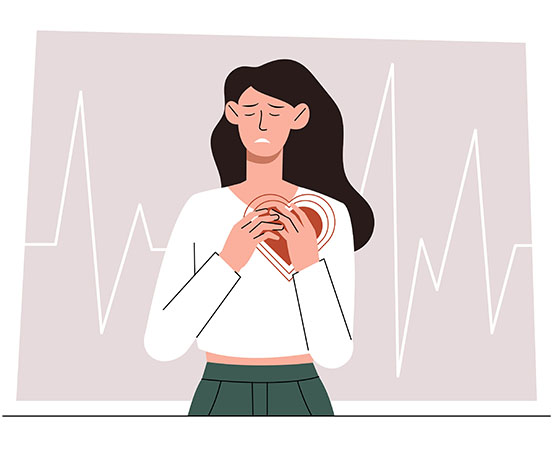
Heart disease is more common in men. But women, who are protected by the hormone estrogen until menopause, are also at risk of heart attacks and other heart diseases even in their menstrual age due to factors like smoking, alcohol and co-morbidities.
Symptoms of heart disease in women
Women also experience the symptoms of heart disease differently. Though chest pain is a typical symptom of heart disease, experts say that women usually feel discomfort in the chest on and off. Before the onset of menopause, Sugandhi Vishwanathan, a 56-year-old principal of an international school in Puducherry, experienced a similar discomfort while walking uphill. She also felt a burning sensation in her chest which she brushed off, mistaking it for acidity.
Dr Manoj Bansal, consultant, cardiology at Kokilaben Dhirubhai Ambani Hospital, Indore, says the symptoms of heart disease are different in women. “In women, chest pain may not always be the first symptom or may not be so noticeable. The symptoms can be vague and hence, they might [delay] seeking medical attention. Also, they tend to have symptoms more often when they are resting,” he says. Here are some symptoms observed in women:
- Pain in the neck and jaw
- Pain in the upper abdomen and back
- Pain in one arm which can radiate to the other
- Nausea or vomiting.
Vishwanathan has always been active and stress-free, but she has been insulin-dependent since 2005 with a family history of heart attacks. In 2017, she had to undergo a health check-up to opt for a life insurance policy.
Her cardiac stress test was stopped abruptly during the check-up and she was referred to a cardiologist to rule out any heart issues. It came as a shock that she had three blocked arteries – 99 per cent, 88 per cent and 80 per cent. The doctor recommended that she undergo an angioplasty and get stents.
Other factors that increase the risk of heart attacks among women are the same as those in men. They include smoking, alcohol, high cholesterol, diabetes, obesity, unhealthy diet, physical inactivity and high blood pressure.
Effect of hormones on heart disease in women
Dr Guruprasad, cardiac electrophysiologist at Fortis Hospital, Chennai, says, “During the menstrual cycle, there is a definite protection against heart attacks because of the hormones estrogen and progesterone. However, even in menstruating young women, the prevalence of both diabetes and hypertension is increasing, leading to a rise in heart attacks.”
He adds that these hormones prevent the accumulation of cholesterol in the arteries, reducing the risk of a heart attack. “But they lose the protection once they become diabetic or attain menopause,” he says.
Dr Sreeja Rani V R, senior consultant, obstetrics & gynaecology at Kinder Women’s Hospital and Fertility Centre, Bengaluru, says, “In women, coronary arteries are smaller and thinner than in men. The density of microvasculature (the micro blood vessels) is also less. They can go into heart failure with preserved ejection fraction [where the stiffening of the left ventricle muscle makes it difficult for the heart to relax, increasing pressure in the heart and affecting blood circulation]. Of course, women can mistake the symptoms for other conditions like gastritis or breast pain, making the condition worse.”
Pregnancy, stress and heart disease
“About one in five women in the reproductive age group have high blood pressure levels, and it often goes underdiagnosed. Pregnant women with high blood pressure have twice the risk of developing heart disease later in life,” says Dr Bansal.
Women are at a greater risk for heart disease, Dr Rani says, if they have had pregnancy-induced hypertension, gestational diabetes or other adverse pregnancy outcomes.
Some connective tissue disorders like psoriatic arthritis (a type of arthritis that affects some people with psoriasis) are also more common in women. They predispose women to heart disease before menopause. “Health conditions like thrombophilia, which leads the blood to form clots easily, can also increase the risk of heart disease among women,” she says.
Dr Bansal says that emotional stress is a big risk factor for heart issues in women. “Stress increases cholesterol, sugar levels and blood pressure. The resting heart rate also goes up. The multiplicative effect of these risk factors leads to heart attacks. Most women are multitasking, taking care of their families and career. So, they forget to take care of themselves and miss the opportunity to [be diagnosed] earlier,” he says, adding that a late diagnosis can affect their quality of life and lead to costlier treatments.
Takeaways
- Women are protected against heart disease until menopause due to the sex hormones estrogen and progesterone.
- However, the risk of heart disease is rising among young women due to poor lifestyle, diabetes, cholesterol and hypertension.
- The symptoms are different in women, and hence, can be misdiagnosed or cause a delay in seeking medical attention.
- Experts say stress is a big risk factor for heart issues in women. As it can lead to high cholesterol, blood sugar and blood pressure, it accelerates the clogging of arteries (atherosclerosis).
- Regular health check-ups can help detect heart issues on time and prevent further complications.


















4 Responses
Very good information
Thanks for the positive response!
Good information, worth reading
Thanks for the positive response!